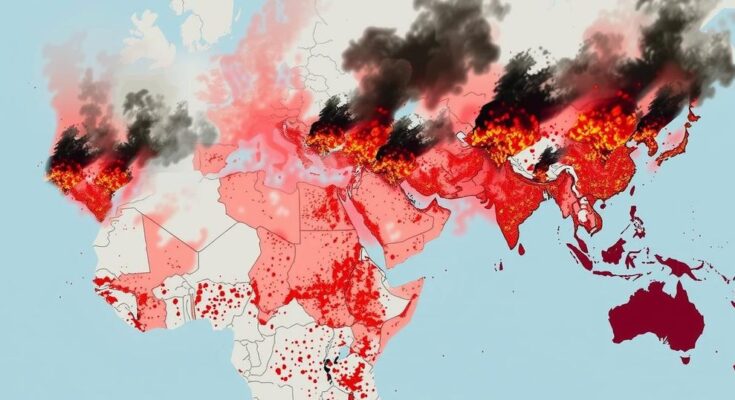South Sudan endures escalating communal violence impacting civilians, with increased killings and abductions reported. In Syria, the WHO has delivered medical supplies to address urgent health requirements, while Gaza faces tragic child fatalities due to hypothermia amid conflicts obstructing humanitarian aid. The situation demands immediate attention and concerted efforts to enhance safety and aid access in affected regions.
Communal violence continues to be the principal cause of conflict in South Sudan, affecting countless civilians, as reported by the United Nations Mission in South Sudan (UNMISS). Between July and September of the previous year, there was a significant rise in abductions and instances of combat-related sexual violence, with 299 non-combatants killed, 310 injured, and 151 abducted. Warrap State recorded the highest number of casualties, while Central Equatoria State saw the majority of abductions. UNMISS expressed alarm regarding ongoing tensions between government forces and various armed groups, emphasizing the need for comprehensive investigations into human rights violations.
In Syria, the World Health Organization (WHO) has initiated its humanitarian air charter for the year, delivering over 32 tons of medical supplies aimed at addressing the urgent healthcare needs of approximately 300,000 individuals. This shipment follows previous deliveries that have bolstered local hospitals. On the ground, aid efforts are expanding, with the World Food Programme targeting food distribution partnerships and a training mission conducted for paramedics on trauma care.
In Gaza, tragic news emerged concerning a one-month-old infant who succumbed to hypothermia, marking the eighth child to die from cold-related causes in recent weeks. Ongoing conflict severely restricts access to humanitarian aid, with WHO highlighting the dire situation at Kamal Adwan Hospital, now out of service, and calls for the release of its detained director. Access to northern Gaza remains largely obstructed by Israeli authorities, complicating efforts for humanitarian assistance.
The state of humanitarian affairs in South Sudan, Syria, and Gaza is dire, marked by increasing violence, health crises, and inadequate access to essential resources. In South Sudan, a history of intercommunal violence exacerbates an already precarious humanitarian situation, which is well-documented by UNMISS. Meanwhile, Syria’s lengthy civil conflict continues to necessitate ongoing international aid initiatives driven by organizations like the WHO, aimed at mitigating health risks amid chronic shortages. Lastly, the Gaza Strip has faced severe weather-related incidents combined with ongoing hostilities, resulting in preventable fatalities among vulnerable populations, especially children. These ongoing crises highlight the urgent need for effective interventions and peace talks to stabilize these regions.
The situation across South Sudan, Syria, and Gaza remains critical, characterized by violence, health concerns, and humanitarian neglect. UNMISS’s reports from South Sudan reveal an alarming rise in casualties linked to violence, while the WHO’s initiatives in Syria signify an ongoing effort to alleviate pressing medical needs. Meanwhile, the tragic loss of life among children in Gaza due to preventable conditions amplifies calls for enhanced protection of civilians. There is an urgent need for collaborative efforts from local and international entities to address these challenges effectively and ensure the safety and well-being of affected populations.
Original Source: news.un.org




